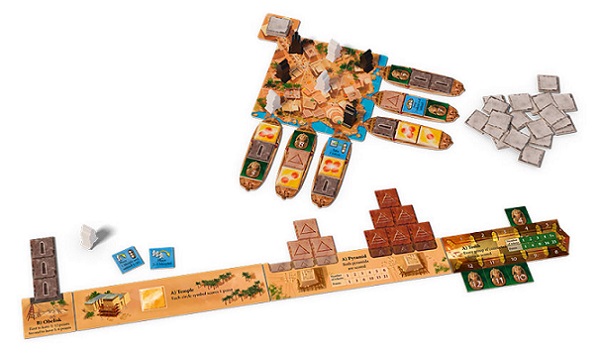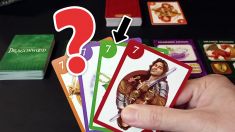Compete to Build Pyramids, Temples, and Tombs in Imhotep: The Duel

Play as Nefertiti and Akhenaten, as you compete to build the most impressive pyramids, temples, and tombs in all of Egypt.
A two-player game based on the Spiel des Jahres nominee Imhotep, Imhotep: The Duel takes inspiration from its predecessor while also including new concepts and getting rid of others.
Gameplay
The harbor board, which is a three by three grid, is placed in the center of the table and six boat tokens are placed along two sides of the harbor board, with three random cargo tokens placed face-up on each boat.
On your turn you may choose one of three actions. You may place one of your four meeples on any empty space on the harbor board, or you may unload a boat. You may unload any boat which has at least two meeples in the row or column that is adjacent to it on the board. Each meeple then gets to claim one cargo token from the boat. The meeple closest to the boat takes the cargo token that is the farthest back in the boat, and so forth until each meeple has taken a token. Each player is working on five different monuments. When you claim a cargo token, it goes towards the monument it matches. The meeples are then returned to their respective players. If there is a token remaining after unloading the boat, it is discarded.
Some tokens are special actions, such as allowing you to place multiple meeples or place a meeple and unload a boat. Your third possible action is to play one of these tokens that you’ve collected on a previous turn. Once a boat is unloaded, you add three new tokens to it. If there are no new tokens to add, the boat is removed from the game.
The game ends once all but one boat has been removed from the game, then players calculate points based on their monuments. You earn one point for each token in your obelisk, and six points for having more than your opponent. You earn one point for each circle symbol on the tokens in your temple. You earn points based on the number of tokens in your two pyramids, and points for creating consecutive sets of numbered tomb tokens. You also gain an additional point for any unused action tokens, and for meeples still on the harbor board.

Review
Imhotep: The Duel is a well-balanced two player game with some tough choices to make, while being easy to learn and accessible to new players. You need to pay as much attention to your opponent’s monuments and which boats they’re setting themselves up to unload, as to your own actions and what will benefit you. Strategically, sometimes you may need to sacrifice the move that best helps you out, in order to stop your opponent from a certain action on their own turn. This back and forth is interesting and engaging, and can lead to some truly tense gameplay.
It is a smaller game than its predecessor and does miss out on some of what made the original game special. For instance, The Duel lacks some of the building elements and tactile charm of the original. You’re no longer stacking blocks or scoring points based on where they land in a 3D structure — the cubes are replaced with simple cardboard tokens that in general are placed next to your board. These tokens must be shuffled and placed face-down during setup (a draw bag would have been more convenient). The movement of the boats to different areas of the harbor is also missing; in The Duel, the boats remain stationary for the entire game, until being removed when there are no more tokens available.
However, the game also brings some interesting new concepts that weren’t present in the previous Imhotep. The harbor board offers a neat resource gathering mechanism — since any space on which you place a meeple is part of a row and column for two different ships, it gives an extra layer to your placement choices.
While the original Imhotep can be played with two players, it shines the most with three or four. To fill in the gap for two players, Imhotep: The Duel does truly live up to its name and feels like a tense back and forth duel. It is different enough to feel like its own game, even if lacks some of the elements that made the original so special.
Pros: Easy to learn, feels like its own game, good back and forth between players
Cons: Lacks some of the tactile elements of the original game, components are not as impressive
Disclosure: we received a complimentary review copy of this game.












